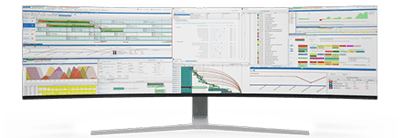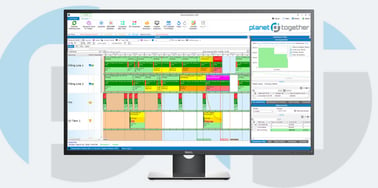Distributed Demand Signals
The ability to synchronize operations with distributed demand signals is crucial for success in packaging manufacturing. With the rise of globalization and e-commerce, manufacturers face the challenge of managing fluctuating demands from diverse markets while maintaining efficiency and quality standards. This is where advanced scheduling solutions, integrated with enterprise resource planning (ERP), supply chain management (SCM), and manufacturing execution systems (MES), play a pivotal role.
In this blog, we'll look into the complexities of scheduling for distributed demand signals in packaging manufacturing, exploring the significance of integration between scheduling software like PlanetTogether and leading ERP, SCM, and MES systems such as SAP, Oracle, Microsoft, Kinaxis, and Aveva.

Understanding Distributed Demand Signals
In packaging manufacturing, demand signals can originate from various sources including:
Regional Variances: Different regions may have distinct consumer preferences, seasonal trends, or regulatory requirements, leading to varied demand patterns.
E-commerce Dynamics: The growth of e-commerce has revolutionized the packaging industry, introducing rapid changes in demand influenced by online shopping trends, promotional events, and customer expectations for fast delivery.
Product Customization: With the increasing demand for personalized products, manufacturers must accommodate custom orders, further diversifying demand signals.
Supply Chain Disruptions: External factors such as raw material shortages, transportation delays, or geopolitical events can disrupt the supply chain, affecting demand signals unpredictably.

Challenges of Scheduling for Distributed Demand Signals
Managing scheduling in the face of distributed demand signals poses several challenges:
Complexity: Coordinating production across multiple product lines, facilities, and geographical locations adds complexity to scheduling, requiring real-time adjustments to meet changing demands.
Lead Time Variability: Fluctuating lead times for raw materials, equipment availability, and transportation logistics can impact scheduling accuracy, leading to delays or excess inventory.
Resource Optimization: Maximizing resource utilization while balancing conflicting priorities such as minimizing changeovers, meeting delivery deadlines, and reducing production costs requires sophisticated scheduling algorithms.
Data Integration: Siloed data across disparate systems hinders visibility and decision-making, making it difficult to synchronize scheduling with demand forecasts, inventory levels, and capacity constraints.
![]()

The Role of Integrated Scheduling Solutions
To address these challenges, packaging manufacturers are turning to integrated scheduling solutions that seamlessly connect scheduling software with ERP, SCM, and MES systems. Here's how integration facilitates efficient scheduling for distributed demand signals:
Real-Time Data Syncing: Integration enables real-time data exchange between scheduling software and other systems, providing up-to-date information on orders, inventory levels, production capacity, and resource availability.
Demand Forecasting: By integrating with ERP and SCM systems, scheduling software can access demand forecasts, sales orders, and market trends to anticipate future demand signals, allowing proactive scheduling adjustments.
Capacity Planning: Integrated scheduling solutions leverage MES data to assess equipment performance, downtime, and maintenance schedules, optimizing capacity utilization and minimizing production bottlenecks.
Order Prioritization: With visibility into order status and customer priorities from ERP systems, scheduling software can prioritize orders based on delivery deadlines, order size, and customer preferences, ensuring on-time delivery.
Scenario Analysis: Integrated scheduling solutions support scenario analysis by simulating different production scenarios, considering factors like demand variability, resource constraints, and order mix, to identify optimal scheduling strategies.

PlanetTogether Integration with ERP Systems
Let's consider the integration between PlanetTogether, a leading scheduling software, and ERP systems like SAP, Oracle, Microsoft Dynamics, Kinaxis, and Aveva.
SAP Integration: By integrating with SAP ERP, PlanetTogether gains access to SAP's rich data repository, including sales orders, production orders, bills of materials, and master production schedules. This enables synchronized scheduling across production facilities, ensuring alignment with SAP's business processes and enhancing decision-making capabilities.
Oracle Integration: Integration with Oracle ERP streamlines order processing, inventory management, and production planning, enabling PlanetTogether to incorporate Oracle's real-time data into scheduling algorithms. This integration facilitates optimized resource allocation, reduced lead times, and improved production efficiency.
Microsoft Dynamics Integration: PlanetTogether's integration with Microsoft Dynamics ERP enhances scheduling agility by leveraging Microsoft's comprehensive suite of business applications. This integration enables seamless data flow between scheduling and ERP systems, empowering manufacturers to adapt quickly to changing demand signals and market dynamics.
Kinaxis Integration: Integration between PlanetTogether and Kinaxis RapidResponse SCM platform enables end-to-end visibility and collaboration across the supply chain. By synchronizing scheduling with Kinaxis' demand sensing capabilities and supply chain analytics, manufacturers can proactively respond to distributed demand signals, mitigating risks and capturing new opportunities.
Aveva Integration: PlanetTogether's integration with Aveva MES enables closed-loop manufacturing execution, where scheduling decisions are executed seamlessly on the shop floor. By connecting scheduling with MES data on equipment performance, quality metrics, and production status, manufacturers can achieve operational excellence and continuous improvement in packaging manufacturing.
In the era of distributed demand signals, effective scheduling is a strategic imperative for packaging manufacturers seeking to stay competitive in a rapidly evolving market. Integrated scheduling solutions, such as PlanetTogether integrated with leading ERP, SCM, and MES systems, offer a holistic approach to scheduling that aligns production with fluctuating demand signals, optimizes resource utilization, and enhances operational agility.
By harnessing the power of integration, packaging manufacturers can navigate the complexities of distributed demand signals with confidence, ensuring responsiveness, efficiency, and customer satisfaction in today's dynamic business environment.
Are you ready to take your manufacturing operations to the next level? Contact us today to learn more about how PlanetTogether can help you achieve your goals and drive success in your industry.
Topics: PlanetTogether Software, Integrating PlanetTogether, Adaptive Capacity Planning, Real-Time Data Syncing and Communication, Dynamic Order Prioritization, Accurate Demand Forecasts, Efficient What-If Scenario Analysis, Packaging Manufacturing, Distributed Demand Signals




















LEAVE A COMMENT